Flight
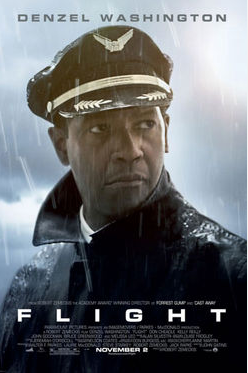
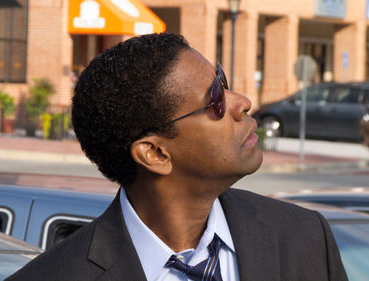 As the film opens, airline pilot Whip Whitaker (Denzel Washington) wakes up the same way he does a lot of mornings - hungover in a hotel room with an equally hungover naked woman beside him. He has a flight in less than two hours, so to wake himself up, he takes a hit on the woman's joint, then snorts some coke on the nearby desk. Moments later, he's heading off to work to be a Captain on a flight from Florida to Atlanta. As he enters the cockpit of the plane, his co-pilot is suspicious about Whip's behavior, but says nothing. No one even notices that he slips some miniature liquor bottles into his orange juice. The plane takes off in the midst of a terrible storm. It is a harrowing ordeal, but the plane brakes through the clouds okay. It would seem the worst is over, but later in the flight, the plane suddenly malfunctions and plummets into a nosedive.
As the film opens, airline pilot Whip Whitaker (Denzel Washington) wakes up the same way he does a lot of mornings - hungover in a hotel room with an equally hungover naked woman beside him. He has a flight in less than two hours, so to wake himself up, he takes a hit on the woman's joint, then snorts some coke on the nearby desk. Moments later, he's heading off to work to be a Captain on a flight from Florida to Atlanta. As he enters the cockpit of the plane, his co-pilot is suspicious about Whip's behavior, but says nothing. No one even notices that he slips some miniature liquor bottles into his orange juice. The plane takes off in the midst of a terrible storm. It is a harrowing ordeal, but the plane brakes through the clouds okay. It would seem the worst is over, but later in the flight, the plane suddenly malfunctions and plummets into a nosedive.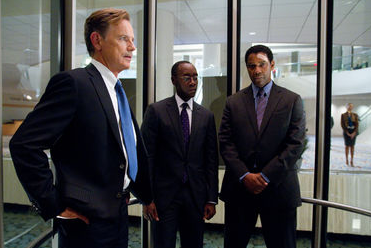 The resulting sequence is nothing short of spellbinding and horrifying, as Whip struggles to take control of the plummeting aircraft. He inverts the plane to level out their descent, and ultimately lands in a field near a church. Due to his actions, the casualties on the plane are minimal (two crew members, four passengers), and nearly everyone, including Whip, walks away from the crash alive. Whip awakens in a hospital with a minor concussion and pain. He also awakens to find himself a hero in the eyes of the media for pulling off such a tricky landing with minimal loss. Before he can enjoy his sudden fame, however, he is approached by a pilot's union rep named Charlie Anderson (Bruce Greenwood) and a Chicago attorney named Hugh Lang (Don Cheadle). They tell him that while Whip was unconscious, his blood alcohol level was tested, and it was found to be well above the legal limit. While the plane did malfunction, the fact that he shouldn't have been piloting it in the first place in his drunken state could cause problems once they come to light in the press.
The resulting sequence is nothing short of spellbinding and horrifying, as Whip struggles to take control of the plummeting aircraft. He inverts the plane to level out their descent, and ultimately lands in a field near a church. Due to his actions, the casualties on the plane are minimal (two crew members, four passengers), and nearly everyone, including Whip, walks away from the crash alive. Whip awakens in a hospital with a minor concussion and pain. He also awakens to find himself a hero in the eyes of the media for pulling off such a tricky landing with minimal loss. Before he can enjoy his sudden fame, however, he is approached by a pilot's union rep named Charlie Anderson (Bruce Greenwood) and a Chicago attorney named Hugh Lang (Don Cheadle). They tell him that while Whip was unconscious, his blood alcohol level was tested, and it was found to be well above the legal limit. While the plane did malfunction, the fact that he shouldn't have been piloting it in the first place in his drunken state could cause problems once they come to light in the press.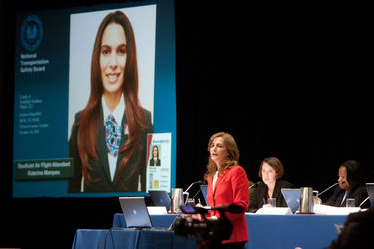 The movie raises an interesting question around this point - Was it the combination of alcohol and drugs in his system which led to the unorthodox thinking that led to the saving of hundreds of lives? It raises the question, but never really digs into it. Instead, the remainder of the movie turns into a predictable series of events where Whip refuses to admit he has a problem, even though it's painfully obvious to everyone around him. His drinking and drug use has already cost him the marriage to his former wife, and the respect of his teenage son, who wants nothing to do with him. Now, if word gets out, his entire career and future could be in jeopardy. This could make for compelling drama, but it's built on a stack of worn cliches. We even get a scene where a friend and former addict (Kelly Reilly) tries to help him by taking Whip to an AA meeting. During the meeting, Whip simply rolls his eyes, and leaves early, heading out to buy more alcohol.
The movie raises an interesting question around this point - Was it the combination of alcohol and drugs in his system which led to the unorthodox thinking that led to the saving of hundreds of lives? It raises the question, but never really digs into it. Instead, the remainder of the movie turns into a predictable series of events where Whip refuses to admit he has a problem, even though it's painfully obvious to everyone around him. His drinking and drug use has already cost him the marriage to his former wife, and the respect of his teenage son, who wants nothing to do with him. Now, if word gets out, his entire career and future could be in jeopardy. This could make for compelling drama, but it's built on a stack of worn cliches. We even get a scene where a friend and former addict (Kelly Reilly) tries to help him by taking Whip to an AA meeting. During the meeting, Whip simply rolls his eyes, and leaves early, heading out to buy more alcohol.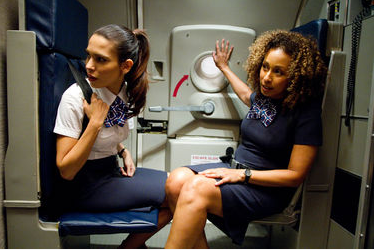 As the movie goes on, and Whip is forced to fight his demons and temptations for an upcoming testimony to a council about what happened the day of the crash, the movie goes to convoluted lengths to keep him drinking. For example, the night before he's going to go before the council, Whip is placed in a hotel room with a guard outside the door, making sure he doesn't leave to feed his personal habits. Even the room's minibar has been stocked solely with juices and soda, at the request of the lawyer representing him. But then, in the middle of the night, a stray gust of wind blows open the door to the connecting room, which Whip wanders into, and finds a minibar filled to the brim with alcoholic beverages. As he stares at the bottles, the only thing missing are a little cartoon angel and devil to appear on his shoulders, arguing whether or not he should give in to temptation.
As the movie goes on, and Whip is forced to fight his demons and temptations for an upcoming testimony to a council about what happened the day of the crash, the movie goes to convoluted lengths to keep him drinking. For example, the night before he's going to go before the council, Whip is placed in a hotel room with a guard outside the door, making sure he doesn't leave to feed his personal habits. Even the room's minibar has been stocked solely with juices and soda, at the request of the lawyer representing him. But then, in the middle of the night, a stray gust of wind blows open the door to the connecting room, which Whip wanders into, and finds a minibar filled to the brim with alcoholic beverages. As he stares at the bottles, the only thing missing are a little cartoon angel and devil to appear on his shoulders, arguing whether or not he should give in to temptation.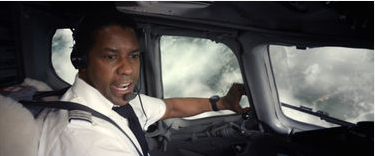 Flight is not a bad movie by any stretch of the imagination. It's well-acted, and the depiction of the plane crash early in the film is bound to leave jaws on the floor, and probably have more than a few people second guessing their holiday travel plans. I guess I expected a little bit more, since this is the first live action film since 2000's Castaway for director Robert Zemeckis. (He spent the last decade working on high end motion capture animated films like The Polar Express and Beowulf.) This is definitely darker and far more somber material than we're used to seeing from Zemeckis. I have no problem with that. I just was disappointed with how simplistic the screenplay handles its dramatic situation. It takes it at face value, much the same way a high school educational film about teen drinking would, and never really bothers to delve deeper into the characters, or the questions its own premise raises.
Flight is not a bad movie by any stretch of the imagination. It's well-acted, and the depiction of the plane crash early in the film is bound to leave jaws on the floor, and probably have more than a few people second guessing their holiday travel plans. I guess I expected a little bit more, since this is the first live action film since 2000's Castaway for director Robert Zemeckis. (He spent the last decade working on high end motion capture animated films like The Polar Express and Beowulf.) This is definitely darker and far more somber material than we're used to seeing from Zemeckis. I have no problem with that. I just was disappointed with how simplistic the screenplay handles its dramatic situation. It takes it at face value, much the same way a high school educational film about teen drinking would, and never really bothers to delve deeper into the characters, or the questions its own premise raises.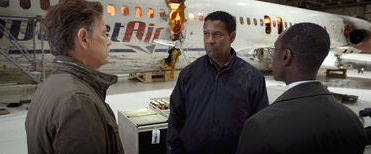 But then came the ending. I think that was the deciding factor in my decision to vote this film just below a recommendation. The last 10 minutes or so of the film are basically spent spelling out everything that we've already picked up on. Instead of being subtle, it ends by hammering its point home over and over until I just wanted it to stop. I don't know if it was studio interference or what, but something about the way this movie ended gave me the impression that it was tacked on at some later point. It turns what was up to that point a cliched, but adult film about addiction, into a simple-minded one where the main character looks into the camera, and gives a speech about what he has learned. Why was this ending necessary? Why couldn't it have closed on a more subtle note?
But then came the ending. I think that was the deciding factor in my decision to vote this film just below a recommendation. The last 10 minutes or so of the film are basically spent spelling out everything that we've already picked up on. Instead of being subtle, it ends by hammering its point home over and over until I just wanted it to stop. I don't know if it was studio interference or what, but something about the way this movie ended gave me the impression that it was tacked on at some later point. It turns what was up to that point a cliched, but adult film about addiction, into a simple-minded one where the main character looks into the camera, and gives a speech about what he has learned. Why was this ending necessary? Why couldn't it have closed on a more subtle note?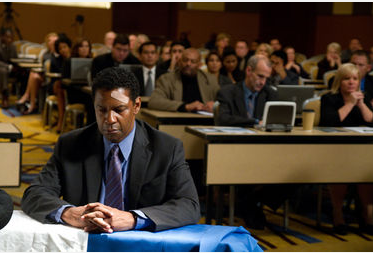
See the movie times in your area or buy the DVD at Amazon.com!






0 Comments:
Post a Comment
<< Home